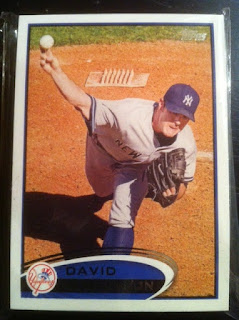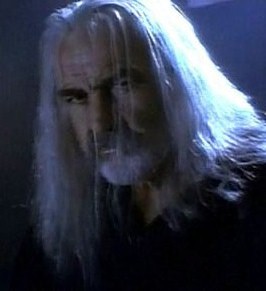They also run two of the best blogs out there and I would encourage everyone to check them out on a regular basis!
Now, on to my own great experience with Mr. John "Mule" Miles. He signed the ROMLB that I sent to him along with a Signature Card and one other very special item. He also took the time to write a letter in response to several questions that I had inserted throughout my letter to him.
There's something special about reading through the incredible memories of extraordinary times from his own hand. His story is quite remarkable. Here's my attempt to do it justice.
I asked Mr. Miles what his fondest memories were from his playing days with the Giants in the Negro American League:
"The players accepted me as a player, brother and friend - helping me along the way. There were tears, joys, triumph and laughter as we played the game. We won most of our games. Those we lost we did so in a very sportsman-like manner. I have no regrets. The Giants were good." *
John Miles never played in the major leagues but I think we could all agree that a mental asterisk could be applied to a discussion of players who played the game in any of the Negro Leagues during baseball's segregated period. Mr. Miles only played professionally for a few years, from 1946 to 1952. At the urging of his friends, he tried out for the Chicago American Giants in '46 and made the team, where he went on to play professional ball for about $300 per month. At 6'3" and almost 230 pounds, Miles was an imposing figure. He was known to have strong wrists and "wiry arms". Despite a lack of speed, he played both 3B and all three outfield positions and was known to have pretty good range with a strong arm.
I asked Mr. Miles if there was any particular home run from his career that sticks out in his mind:
"In 1948, hitting two home runs in one ball game. The nickname "Mule" was originated by the manager, Jim "Candy" Taylor. Also, hitting 11 home runs in 11 straight games. Still sticks out." *
In retrospect, I now feel like my question was a bit rhetorical! Of course it would be his streak of 11 and dual-homer game that resonate in his memory as he looks back. I love the introspective sense that you get with his wording. I can almost see him referring to the streak of 11 before leaning back in his chair for a moment and then nodding to himself and, with a quick grin, whispering "...still sticks out..."
In 1948, John Miles slammed 27 home runs despite batting in the bottom half of the Giants' order, hitting at a steady .250 clip for the season. Most of those 27 home runs came during his famous streak of 11 home runs in 11 games. It shattered any existing record at the time and would still stand today in the major leagues. This particular record has special meaning for me as a Don Mattingly fan. Donnie's clubbing of eight home runs in eight consecutive games in 1987 is one of my favorite highlights for my favorite all-time player. The Hitman matched Dale Long's previous mark in 1956 and then Ken Griffey Jr. repeated the feat in 1993. Pretty good company!
As Mr. Miles described above, he displayed his raw power throughout his years with the Giants, earning his nickname after hitting two homers in one game. His coach, 'Candy Jim' Taylor quipped to his young player, "You hit that ball like a mule kicks!" - the name stuck. With the color barrier broken in baseball by Jackie Robinson, "Mule" Miles went on to become the first African American ball player in the South Texas League where he would play for the Laredo and San Antonio until he retired in '52.
John Miles played with many great ball players. I asked him who the best pitcher, hitter or defensive player was that he ever faced on an opposing team. I followed that query up by asking who amongst the present-day players did he enjoy watching the most:
"The best pitcher was Satchel Paige. I never got a hit off of Satchel. Josh Gibson was the best hitter and defensive player, with the Homestead Gray's. Present-day team - the Texas Rangers. Player - Josh Hamilton with the Rangers." *
Most impressively to me, John Miles is a military veteran. As a veteran myself and the son/grandson/brother-in-law of four servicemen in my family, I can't help but admire the players from baseball's golden age who put on their country's uniform in addition to playing professional baseball. Add to this the additional challenge of severe racial prejudices that African Americans faced during World War II and his legacy becomes even more awe-inspiring. In 1942, John Miles enlisted in the United States Army Air Corps and attended Aircraft Mechanic Journeyman Rating School in Tuskegee, Alabama. It was here that contributed to the maintenance of aircraft destined for service with the Nation's first African-American aviation program, the "Black Wings". This group of pioneering patriots is more famously known as the Tuskegee Airmen. I was very hesitant to ask Mr. Miles about his experience as a Tuskegee Airman. For so many veterans, their service during times of war is very personal. Often times, they are either too humble to expound upon their memories or are reluctant to do so because of the pain, loss or regret those times might represent. In the end, I decided to thank him for his service and related my own military connections to let him know that I understood how special his sacrifice had been. I'm glad I did. Mr. Miles was very honest and succinct in his response but his pride in the accomplishments of that courageous group of pioneering aviators is what really shines through.
What was the most moving moment for you, good or bad, during your time in the service?
"I did not fly in combat on missions but I am proud that I am a member of a group that established all kind of records flying fighter planes. despite the racial barrier of that time they never lost a bomber to the enemy. The Tuskegee Airmen, the 99th Squadron." *
The paragraph above is an absolute treasure for me. One of my grandfathers was a radioman on B-24 Bombers and flew combat missions out of England during World War II. He seldom spoke of his experiences, as they seemed to conjure up painful memories of terror-filled moments and friends who never made it home. My Grandad completed the requisite number of missions that was required of bomber crews in order to fulfill their obligation and earned a ticket home - but not before surviving a crash landing behind enemy lines during one of their final missions. The French Resistance provided support in their escape back to Allied-occupied territory......
Long story short - I am here only because my grandfather fought and survived. And I am sure that at some point - support and protection from fighter escorts helped his B-24 return to soil on the western shores of the English Channel. After some preliminary research, I am fairly certain that his squadron and/or bomber group were never escorted by the 'Red Tails' of the 99th Fighter Squadron - but they were certainly a part of that fearless fraternity in those skies over Europe and Africa. A group of warriors that saved the world while selflessly risking all they had with honor, courage, discipline and pride in what they were doing. I feel like this picture embodies this notion quite well:
Though he is not specifically in this image, Mr. Miles was a member of that group of warriors and has lived by the values I described above for his entire life. He was kind enough to sign this picture for me and I am very excited to share it with you. It is a snap shot of the first graduating class of cadets from the Tuskegee Program, taken on the flight line at the base where Mr. Miles and his fellow soldiers trained, worked and defended the nation. Major James. A. Ellison is shown returning the salute of Cadet Mac Ross.
As you can see, every part of this TTM return has a special meaning for me. As a baseball fan. As an American. As a lover of history. As a veteran.
Thank you for taking the time to answer my questions and sign some keepsakes for me, Mr. Miles. I will treasure them always, and attempt to pay tribute to Americans like you and my grandfather by following in your footsteps with how I live and passing along the lessons of your life to a new generation.
Thanks for reading.
* Some of Mr. Miles' comments from his letter were altered slightly by me (syntax & grammar) for ease of reading in this blog post















































